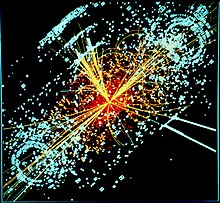Supersymmetry breaking
| Beyond the Standard Model |
|---|
 |
| Standard Model |
In particle physics, supersymmetry breaking or SUSY breaking is a process via which a seemingly non-supersymmetric physics emerges from a supersymmetric theory. Assuming a breaking of supersymmetry is a necessary step to reconcile supersymmetry with experimental observations.[1]
Superpartner particles, whose mass is equal to the mass of the regular particles in supersymmetry, become much heavier with supersymmetry breaking. In supergravity, this results in a slightly modified counterpart of the Higgs mechanism where the gravitinos become massive.[citation needed]
Supersymmetry breaking is relevant in the domain of applicability of stochastic differential equations, which includes classical physics, and encompasses[clarification needed] nonlinear dynamical phenomena as chaos, turbulence, and pink noise.[citation needed] Various mechanisms for this breaking have been discussed by physicists, including soft SUSY breaking and types of spontaneous symmetry breaking.[1][2][3]
Supersymmetry breaking scale
The energy scale where supersymmetry breaking takes place is known as the supersymmetry breaking scale. In the scenario known as low energy supersymmetry, in which supersymmetry fully solves the hierarchy problem, this scale should not be far from 1000 GeV, and therefore should be accessible using the Large Hadron Collider and future accelerators.
However, supersymmetry may also be broken at high energy scales. Nature does not have to be[clarification needed] supersymmetric at any scale.
See also
References
- ^ a b Theis, Ulrich (2007). "An Introduction to Supersymmetry" (PDF). saalburg.aei.mpg.de. Max Planck Society for the Advancement of Science. Retrieved 1 November 2024.
- ^ Jeannerot, Rachel; Rocher, Jonathan; Sakellariadou, Mairi (24 November 2003). "How generic is cosmic string formation in SUSY GUTs": 103514. arXiv:hep-ph/0308134. doi:10.1103/PhysRevD.68.103514.
{{cite journal}}: Cite journal requires|journal=(help) - ^ Kane, Gordon (3 July 1998). Perspectives On Supersymmetry. World Scientific. p. 235. ISBN 978-981-4495-82-0.
